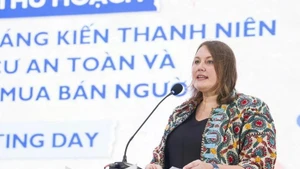More sophisticated scams involve criminals posing as law enforcement officers, contacting victims with threats of involvement in money laundering or transnational drug trafficking. Exploiting fear and confusion, these scammers send arrest warrants via messaging apps like Zalo, complete with accurate personal details, convincing many to comply with their demands.
An anonymous economist recounted being a victim of such a scam, where he was coerced into transferring 500 million VND (19,200 USD) within an hour under the threat of immediate arrest at his workplace.
Another prevalent tactic involves impersonating electricity companies, demanding immediate updates to electricity bills under the threat of power cuts within an hour. Notably, fraudsters have adopted deepfake technology to manipulate videos and audio, impersonating victims’ relatives or authorities to deceive them.
Tran Hoai Thu from Ha Dong District, Ha Noi, shared her experience: “When I received a video call via Facebook from my daughter in Germany, asking me to transfer 1 billion VND (38,500 USD) urgently, the call ended abruptly after 10 seconds. Remembering recent scam warnings in the media, I called my daughter back, only to learn that her Facebook account had been hacked the previous day.”
Despite repeated warnings from law enforcement and media outlets, including direct messages to mobile phones, many individuals continue to fall prey to these scams, resulting in losses amounting to billions of VND.
Lawyer Nguyen Xuan Sang, Head of Vinh Quang Cong Ly Law Office, Ha Noi Bar Association, observed: “The primary reasons for widespread financial fraud online include the sophisticated and systematic methods employed by criminals, who swiftly adapt to countermeasures by authorities. Additionally, breaches in personal data security facilitate these scams. These fraudsters often operate in organised, transnational networks, making detection and tracking exceedingly challenging.
Another significant factor is the public’s complacency, lack of vigilance, and susceptibility to promises of high returns and commissions. Many lack fundamental financial knowledge, rendering them incapable of managing risks. Financial education in Vietnam remains underemphasised and relatively novel.”
In light of these challenges, authorities must prioritise enhancing public financial literacy. Captain Trinh Quoc Hung, Lecturer at the People’s Security Academy, advocated for a comprehensive national strategy on financial education. He suggested integrating basic financial knowledge into school curricula, potentially as a continuous subject from primary through tertiary education, to cultivate robust financial thinking and risk awareness from an early age.
Expanding financial education programmes across various demographics and regions is crucial. Tailored initiatives for students, adults, government officials, workers, retirees, and residents in rural, mountainous, and urban areas can be implemented through mobile applications, online portals, and materials in minority languages. Such efforts would enhance the public’s ability to identify and assess financial risks and scams.
Collaboration with organisations like the Farmers’ Union, Women’s Union, credit funds, and local authorities is essential to conduct training sessions on financial risk management. Emphasis should be placed on community outreach to educate residents about common fraud tactics and foster a culture of vigilance.
Veteran economist Nguyen Tri Hieu highlighted the need for safe investment avenues: “We lack secure investment platforms. It’s imperative to promote the development of mutual funds, bonds, and stock investments, enabling individuals and small investors to participate in regulated markets, thereby reducing susceptibility to online financial scams.”
Implementing a nationwide financial education strategy necessitates coordination among the Ministry of Finance, State Bank of Viet Nam, Ministry of Education and Training, commercial banks, credit funds, and other stakeholders. Funding can be sourced from the state budget, financial institutions, investment funds, and international organisations, including foreign banks offering consumer financial products.
To ensure stability, the financial education strategy should align with the country’s overarching socio-economic development goals. Beyond protecting citizens and maintaining social order, this initiative aims to foster the growth of Vietnam’s financial markets, promote financial inclusion, and support national financial objectives and sustainable development goals.
















